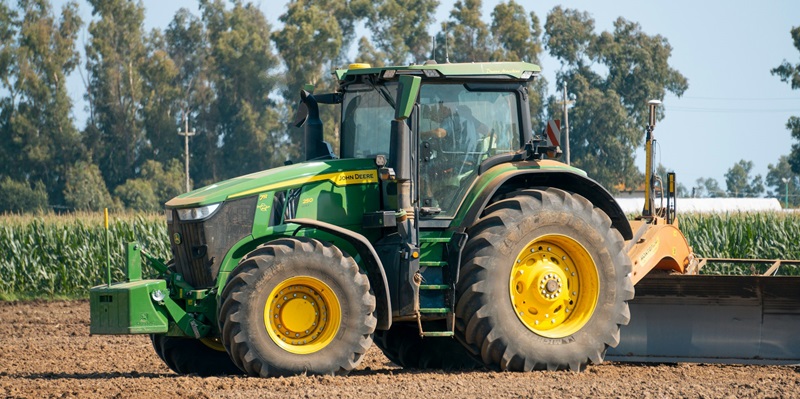John Deere, formally known as Deere & Co., has reached a notable settlement with the U.S. Department of Labor (DOL) following allegations of racial discrimination against Black and Hispanic job applicants at its facilities in Illinois and Iowa. The DOL’s Office of Federal Contract Compliance Programs (OFCCP) found significant hiring disparities through routine compliance evaluations conducted in 2021 and 2022. As a result, John Deere has agreed to pay $1.1 million in back wages and interest to 277 affected individuals and has committed to reforming its hiring practices to ensure fairness and compliance with federal regulations. This settlement marks a significant step in addressing racial discrimination within the company and is one of the most substantial resolutions publicized by the DOL this year.
Investigating Discriminatory Practices
The DOL’s probe into John Deere’s hiring practices revealed statistically significant differences in hiring rates for Black and Hispanic applicants compared to other groups. The evaluations spanned several John Deere facilities, including Milan, Illinois, and Ankeny and Waterloo, Iowa. These discriminatory practices persisted over a defined period, from as early as June 2019 at the Ankeny facility to as late as December 31, 2021, at the Milan facility, prompting the need for corrective measures. These findings demonstrate the persistence of institutional biases, necessitating federal intervention to enforce equal hiring standards and promote a fairer workplace environment.
Financial Settlement and Beyond
Beyond the financial compensation totaling $1.1 million, John Deere’s agreement with the DOL includes several other remedial actions aimed at fostering a more inclusive workplace environment. Among these measures is the extension of 53 job offers to eligible class members who were affected by the discriminatory practices. This action signifies a direct effort to make amends for past wrongs and illustrates John Deere’s commitment to addressing the disparities identified during the evaluations. Additionally, the company’s agreement reflects a broader trend of regulatory oversight aimed at ensuring equity in employment practices among federal contractors.
Additionally, John Deere committed to revising its personnel practices, enhancing recordkeeping, and implementing internal auditing procedures. These structural changes reflect an acknowledgment of previous shortcomings and a commitment to ongoing compliance and fairness in hiring practices. Jen Hartmann, Deere’s Director of Public Relations, emphasized the company’s dedication to promoting diversity, equity, and inclusion within their workforce. These commitments are vital for fostering an equitable work environment and ensuring that all applicants receive fair consideration, regardless of their racial or ethnic background.
Broader Context and Regulatory Oversight
John Deere’s settlement can be viewed against a backdrop of the DOL’s broader efforts to combat discrimination among federal contractors. This year alone, there have been several high-profile resolutions involving major corporations accused of discriminatory practices. For instance, Caterpillar Inc. settled for $800,000 to address similar allegations, and GE Aerospace agreed to a $443,000 settlement over claims of discrimination against female job applicants. These settlements indicate a growing recognition of the need for greater accountability and fairness in hiring practices.
The Office of Federal Contract Compliance Programs has secured a total of $2.7 million in settlements with various federal contractors within the year. These actions highlight the DOL’s commitment to rigorous compliance evaluations and enforcement measures to ensure equal employment opportunities and challenge systemic biases in hiring processes, reflecting a sustained effort to enforce non-discriminatory practices among federal contractors. Such regulatory oversight is essential for rectifying long-standing inequalities and promoting an inclusive workforce across diverse industries.
John Deere’s Commitment to Change
John Deere’s public statements articulate a commitment to reforming discriminatory practices and fostering a more inclusive organizational culture. The company’s actions, involving both financial restitution and structural changes, indicate steps taken to translate these commitments into actionable policies. This includes extending job offers to those previously discriminated against, revising internal practices, and enhancing transparency through better recordkeeping and auditing. These measures represent a comprehensive approach to addressing the issues identified and fostering a more equitable future for all employees.
These multi-faceted actions underscore John Deere’s intention to correct past disparities and demonstrate a newfound dedication to equality in hiring. As outlined by company representatives, the reforms aim to create a fair and equitable future for all job applicants, emphasizing the importance of accountability and proactive change within the organization. By taking these steps, John Deere is setting a positive example for other companies in the industry and reinforcing the importance of fair hiring practices.
Regulatory Efforts and Industry-Wide Implications
In addition to the $1.1 million financial compensation, John Deere’s agreement with the Department of Labor (DOL) involves several initiatives aimed at creating a more inclusive work environment. One key measure is the extension of 53 job offers to eligible class members affected by past discriminatory practices. This effort aims to rectify previous inequities and demonstrates John Deere’s commitment to addressing the disparities identified during reviews. This agreement signifies a larger trend toward regulatory oversight focused on ensuring equitable employment practices among federal contractors.
Furthermore, John Deere has pledged to overhaul its personnel policies, improve recordkeeping, and set up internal auditing procedures. These structural changes indicate a recognition of past failings and a commitment to ongoing fairness and compliance in hiring. Jen Hartmann, Deere’s Director of Public Relations, highlighted the company’s dedication to fostering diversity, equity, and inclusion within their workforce. These commitments are essential for creating a fair work environment and ensuring equal consideration for all applicants, irrespective of racial or ethnic background.

